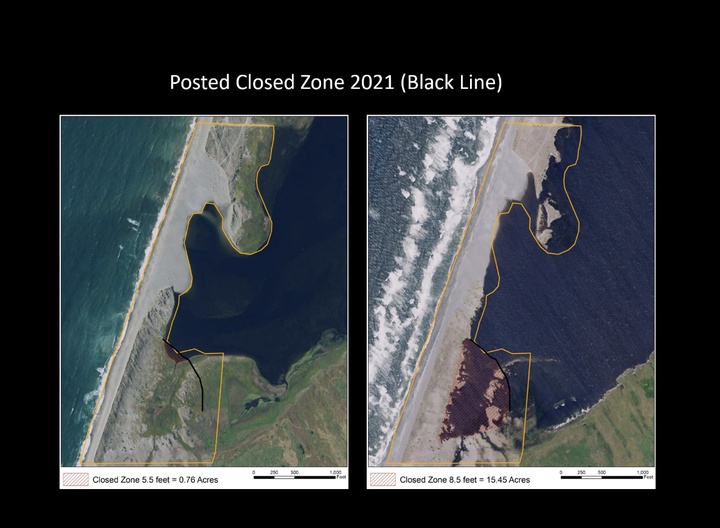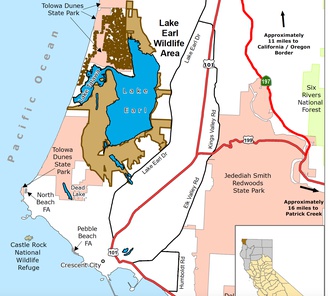Jessica Cejnar Andrews / Thursday, Oct. 20, 2022 @ 2:19 p.m. / Wildlife
Partial Hunting Closures at Restoration Project Area Near South Lake Tolowa Expected, Though Season's Start, End and Holidays Will Be Open

Local duck hunters on Tuesday took issue with the closure of an area near south Lake Tolowa for restoration effort. | Photo courtesy CDFW
Previously:
###

The Lake Earl Wildlife Area will be a topic of discussion at a California Department of Fish and Wildlife meeting on Oct. 18. | Map courtesy of CDFW
Though a California Department of Fish and Wildlife representative pointed out there are 2,000 acres of “hunt-able land” at the Lake Earl Wildlife Area, Del Norte County duck hunters continue to squabble over an up-to 20-acre spot that’s the site of ongoing restoration efforts.
At a public meeting Tuesday, Jeff Reed and other members of the Del Norte Waterfowlers Association said a 2012 dune restoration plan doesn’t mention closing the area off to hunting.
The Tolowa Dunes Stewards, a volunteer-led organization spearheading restoration, advertises their work all year, Reed said. A Wildlife Conservation Board grant the organization received also doesn’t mention hunting closures, he said.
“No disrespect to the work they do and the volunteers they have — that is not our intent — there’s plenty of time to get that work done without impeding legal waterfowl hunting at the wildlife area,” Reed told CDFW land managers.
Reed’s comments came after Shawn Fresz, CDFW’s lands and wildlife supervisor for the northern region, announced that the project area near south Lake Tolowa will be closed to hunting periodically so volunteers can access the area and work. The timing of those closures this year is still to be determined, he said.
But hunters will be able to access the project area the week after waterfowl season opens and the week before it closes, Fresz said. The area will also be open on holiday weekends and “weeks-of,” he said. There’s also the potential to move the project boundaries, according to Fresz.
“I would say in the scheme of things, this closure is very small,” he said. “The department does and will continue to do restoration on our public lands for conservation of native species and threatened species.”
Duck hunting will start Saturday and last through Jan. 31, according to Fresz.
Though the Tolowa Dunes Stewards has been working with CDFW to eradicate European beach grass, Scotch broom and other invasive plants, the organization began working in the project area under a Wildlife Conservation Board grant in 2018. The grant’s aim was to improve habitat for the federally-listed western snowy plover.
By 2018, with only volunteers, the Tolowa Dunes Stewards had restored about 4.39 acres in that project area, Fresz said. Today with a combination of volunteer work, including involvement of youth organizations as well as mechanical work from CalFire and CDFW, 13.63 acres in that area is now divested of European beach grass, he said.
Similar restoration efforts are taking place at adjacent Tolowa Dunes State Park and the natural dune process has been restored on more than 360 acres, Fresz said.
Western snowy plovers have returned to the project area — four nests were found in an area that was just cleared of European beach grass, Fresz said. However, those nests were unsuccessful, he said. Snowy plover breeding season is from Feb. 15-Sept. 15, he said.
“There are many variables for restoration work — the time of the year, the lake level, whether it’s breached or not, tides,” Fresz said. “The presence of plovers really impacts our workability and where we can work and when we can. Any other nesting birds as well, all of this is taken into account before we’re deciding where to work and planning for crews.”
Fresz pointed to General Regulations for Public Use on CDFW lands, which states that the department can close all or portions of the land they manage to visitors entirely, seasonally or to specific uses.
Fresz also showed a map of the posted closure zone in 2021. When the lagoon level was at 5 1/2 feet, 7.06 acres was closed to hunting, he said. When the lagoon rose to 8.5 feet, 15.45 acres were closed to hunting, he said.
Duck hunters at the meeting said last year’s closures took place without their input. Sherman Jackson, a Waterfowlers Association member, said over the last 40 years, more than 1,500 acres has been lost to duck hunting.
“Further closures are absolutely ridiculous during a legal hunting season,” he said.
Joe Reed, another local duck hunter, echoed the group’s sentiment that it’s not against the work the Tolowa Dunes Stewards does. But, he pointed out that the duck stamps required to hunt on the Lake Earl Wildlife Area pay for that restoration work.
Reed also mentioned the Pittman-Robertsons Wildlife Restoration Act, an 11 percent federal tax on firearms, ammunition and archery equipment that is allocated to states for wildlife projects.
“It’s important to point out that we help pay into this public resource,” Reed said, “and it feels like some of it is being taken away.”
For their part, the Tolowa Dunes Stewards isn’t against duck hunting, said director Sandra Jerabek. Restoration doesn’t go on forever, she said, especially when there’s a grant deadline they have to meet.
Deborah Jaques, a wildlife biologist whose expertise is on pelicans and water birds, said the outcry from hunters regarding closure is because Jeff Reed was upset that it was his favorite spot being impacted.
Jaques argued that there’s a safety issue at play as well — the separation of hunting from other public uses in the area.
“The Tolowa Dunes Stewards never asked for any hunting closures, nor was it foreseen and I was involved in printing that (project) plan in 2012,” she said. “It’s not just the restoration project, it’s people out there on the beach, there’s bird watchers that have been confronted by hunters. It’s just people coming together with some incompatible uses and there was only one road to get to the restoration area and there's the breach if it's open, you can’t get to the area. It's really not that sinister.”
Fresz also discussed other CDFW-managed areas on Tuesday, including Point St. George, the Elk Creek Wetlands and the Crescent City Marsh.
Pacific Shores was also discussed. This area is adjacent to the Lake Earl Wildlife Area and is part of an ongoing acquisition effort by CDFW. In 2018, Del Norte County and CDFW removed 200 tons of trash, dozens of vehicles and trailers, mattresses, appliances and tires.
A watch station was installed where Tell Boulevard intersects with Kellogg Road, and CDFW is in the process of removing old roads to restore wetland habitat as mitigation for the Border Coast Regional Airport Authority’s runway safety area.
Restoration efforts at Pacific Shores include European beachgrass and Scotch broom removal and planting western dog violet as a food source for the federally listed Oregon silverspot butterfly, Fresz said.
CLICK TO MANAGE